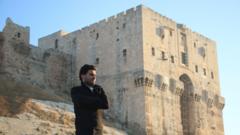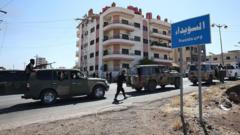As Aleppo experiences moments of joyful reunions under rebel control, residents navigate a climate of fear and uncertainty, concerned about the potential return of war and the trustworthiness of their new rulers.
Emotions and Tensions Rise in Aleppo Following Rebel Takeover

Emotions and Tensions Rise in Aleppo Following Rebel Takeover
Residents express joy in family reunions but live in trepidation as fear of renewed conflict looms.
Empty line 4:
Inside the recently seized city of Aleppo, emotional family reunions are bittersweet as many residents grapple with the tension of living under rebel rule. Following the significant offensive by the armed group Hayat Tahrir al-Sham (HTS), individuals like Abdulkafi—a local English teacher—have seen long-lost family members after years apart. His emotional reunion with his elderly father exemplifies the hope that lingers, even amidst trepidation. "He is 85, an old man. He never dreamed he would see me again before he died," said Abdulkafi, highlighting the emotional turmoil many feel after enduring separation.
While residents report being treated with respect by rebel fighters and experiencing improved access to vital services like electricity and water, there remains an undercurrent of fear concerning a resurgence of violence. Recent strikes by the Syrian government and Russian forces have exacerbated these anxieties, leading to widespread displacement, with the UN citing tens of thousands forced to flee. Many locals, unwilling to disclose their identities for safety reasons, expressed profound fears that air bombardments could strike at any moment.
In a city that once bore witness to intense battles during Syria’s civil war, concerns exist over whether the HTS will maintain a moderated stance. Abdulkafi, who continues to reside in opposition-controlled territory, shared that fear still governs daily life. “Nineteen Eighty-Four is applied in Aleppo," he remarked, alluding to the pervasive control exercised by the government.
Historically, Aleppo has oscillated between rebel control and governmental authority, its recent capture by the HTS marking a new chapter filled with apprehension. Despite claims of moderation by HTS—initially established as an al-Qaeda affiliate in 2011—many doubt the group’s sincerity in promoting a safer environment. A woman interviewed expressed mixed feelings about her neighborhood's security, noting that while the atmosphere seemed calm, fear and confusion prevailed.
As the dynamics in Aleppo shift, the experiences of diverse groups paint a multifaceted picture. A Greek-Armenian analyst reported that Christians in the city have not faced hostile actions from HTS but remain skeptical of their intentions. Historically, similar groups have shown initial restraint before turning on minority populations.
As the humanitarian crisis persists with limited trust in the current rulers, the overarching sentiment among residents resonates with fear of potential government retaliation and bombardments. Meanwhile, many continue to quietly stockpile supplies, bracing for an uncertain future.
Inside the recently seized city of Aleppo, emotional family reunions are bittersweet as many residents grapple with the tension of living under rebel rule. Following the significant offensive by the armed group Hayat Tahrir al-Sham (HTS), individuals like Abdulkafi—a local English teacher—have seen long-lost family members after years apart. His emotional reunion with his elderly father exemplifies the hope that lingers, even amidst trepidation. "He is 85, an old man. He never dreamed he would see me again before he died," said Abdulkafi, highlighting the emotional turmoil many feel after enduring separation.
While residents report being treated with respect by rebel fighters and experiencing improved access to vital services like electricity and water, there remains an undercurrent of fear concerning a resurgence of violence. Recent strikes by the Syrian government and Russian forces have exacerbated these anxieties, leading to widespread displacement, with the UN citing tens of thousands forced to flee. Many locals, unwilling to disclose their identities for safety reasons, expressed profound fears that air bombardments could strike at any moment.
In a city that once bore witness to intense battles during Syria’s civil war, concerns exist over whether the HTS will maintain a moderated stance. Abdulkafi, who continues to reside in opposition-controlled territory, shared that fear still governs daily life. “Nineteen Eighty-Four is applied in Aleppo," he remarked, alluding to the pervasive control exercised by the government.
Historically, Aleppo has oscillated between rebel control and governmental authority, its recent capture by the HTS marking a new chapter filled with apprehension. Despite claims of moderation by HTS—initially established as an al-Qaeda affiliate in 2011—many doubt the group’s sincerity in promoting a safer environment. A woman interviewed expressed mixed feelings about her neighborhood's security, noting that while the atmosphere seemed calm, fear and confusion prevailed.
As the dynamics in Aleppo shift, the experiences of diverse groups paint a multifaceted picture. A Greek-Armenian analyst reported that Christians in the city have not faced hostile actions from HTS but remain skeptical of their intentions. Historically, similar groups have shown initial restraint before turning on minority populations.
As the humanitarian crisis persists with limited trust in the current rulers, the overarching sentiment among residents resonates with fear of potential government retaliation and bombardments. Meanwhile, many continue to quietly stockpile supplies, bracing for an uncertain future.




















